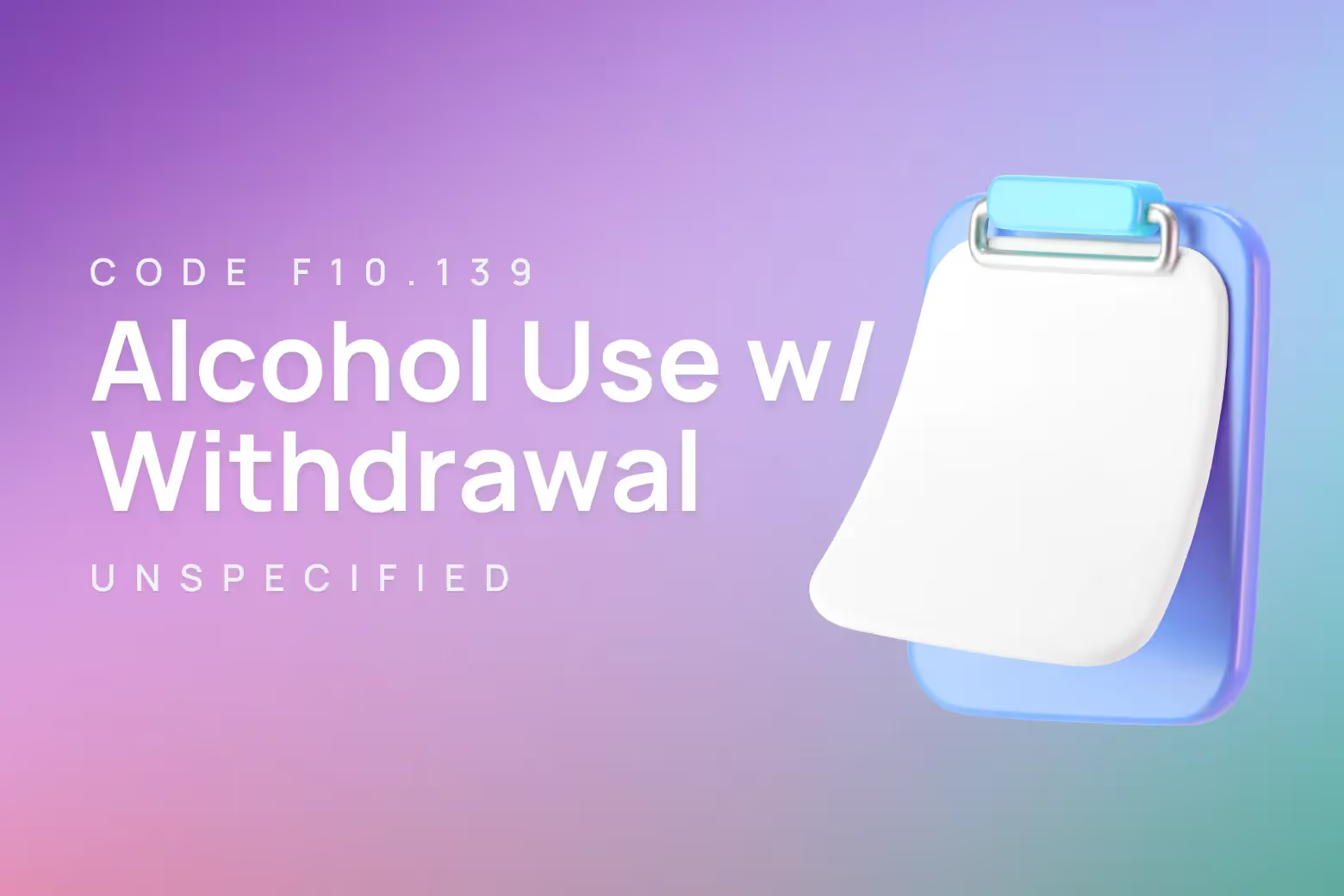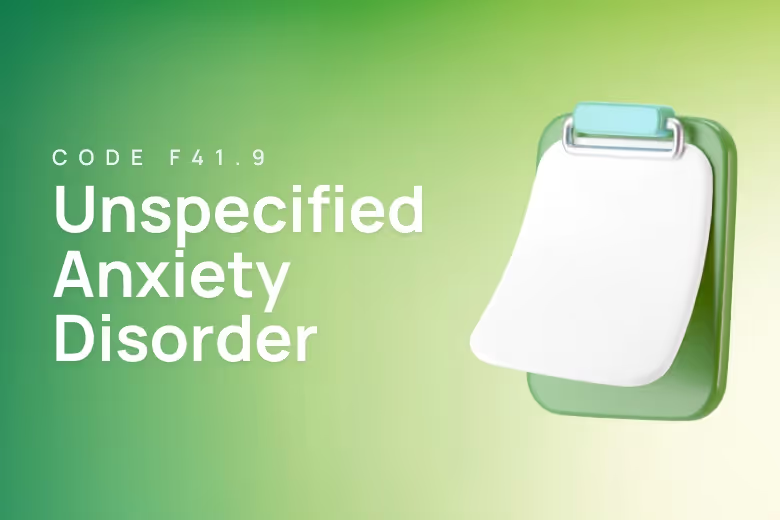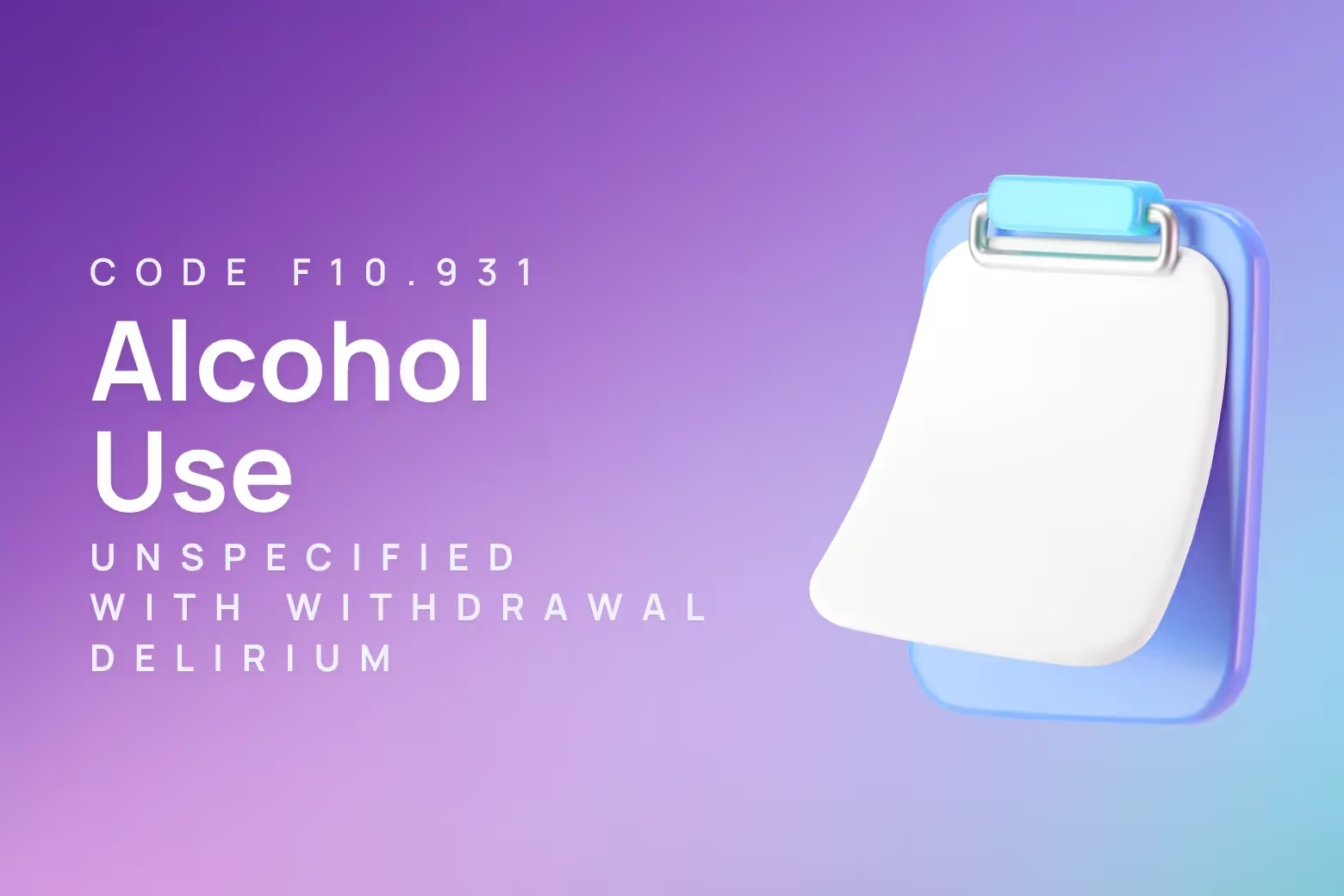ICD-10 code for alcohol abuse with withdrawal, unspecified

F10.139 is the ICD-10 code for alcohol abuse with withdrawal, unspecified.
This code captures situations where individuals meet criteria for alcohol abuse and are experiencing withdrawal symptoms, but the specific characteristics of their withdrawal syndrome haven't been fully detailed or don't meet criteria for more specific subcategories.
Accurate diagnostic coding ensures proper treatment planning and reimbursement for comprehensive care.
Key features:
- F10.139 ICD-10 code represents alcohol abuse with withdrawal symptoms that don't fit more specific subcategories
- Indicates presence of both problematic alcohol use patterns and physiological withdrawal
- Requires evidence of neuroadaptive changes and cessation/reduction in alcohol consumption
- It’s essential to use the correct ICD-10 code for appropriate treatment planning and billing accuracy

Diagnostic criteria for alcohol abuse with withdrawal, unspecified (F10.139)
This diagnosis requires meeting criteria for both alcohol abuse pattern and withdrawal syndrome.
Alcohol abuse represents a problematic pattern of alcohol use leading to clinically significant impairment or distress. The pattern must include at least two symptoms within a 12-month period related to:
- impaired control,
- social impairment,
- risky use, or
- physiological dependence.
The withdrawal component occurs in individuals with sustained heavy alcohol consumption who either stop or substantially decrease their intake.
This neuroadaptive process results from chronic alcohol-induced changes in GABA and NMDA receptor systems.
Key diagnostic requirements include:
- Evidence of alcohol abuse pattern with functional impairment
- Presence of characteristic withdrawal syndrome following cessation or reduction
- Withdrawal symptoms occurring within 6-24 hours after last drink
- Symptoms cannot be better explained by another medical condition
- Withdrawal presentation doesn't meet criteria for more specific categories (uncomplicated, with delirium, with perceptual disturbance)
The withdrawal syndrome manifests through three primary symptom clusters:
- autonomic hyperactivity (sweating, tachycardia, hypertension, tremor)
- gastrointestinal disturbances (nausea, vomiting, anorexia)
- cognitive-perceptual changes (anxiety, agitation, sleep disturbance)
When to use F10.139 diagnosis code
Proper differential diagnosis prevents coding errors and ensures appropriate care planning.
Use F10.139 when withdrawal symptoms are present but don't clearly fit other specific withdrawal subcategories. This occurs commonly in clinical practice when withdrawal presentation is mild to moderate without prominent complications.
F10.139 vs F10.130 (Alcohol abuse with withdrawal, uncomplicated)
F10.130 specifically indicates uncomplicated withdrawal without significant medical or psychiatric comorbidities. Choose F10.139 when the clinical picture includes withdrawal but documentation doesn't clearly establish whether complications are present or absent.
F10.139 vs F10.131 (Alcohol abuse with withdrawal delirium)
F10.131 requires clear evidence of delirium, including disorientation, confusion, and altered consciousness. Use F10.139 when cognitive changes are present but don't meet full delirium criteria.
F10.139 vs F10.132 (Alcohol abuse with withdrawal with perceptual disturbance)
F10.132 involves hallucinations or significant perceptual disturbances while maintaining orientation. Select F10.139 when perceptual symptoms are mild or questionable.
Related ICD-10 codes
- F10.13 - Alcohol abuse, with withdrawal
- F10.130 - Alcohol abuse with withdrawal, uncomplicated
- F10.131 - Alcohol abuse with withdrawal delirium
- F10.132 - Alcohol abuse with withdrawal with perceptual disturbance
Interventions and CPT codes for alcohol abuse with withdrawal
Evidence-based treatment addresses both acute withdrawal management and long-term recovery planning.
Medical withdrawal management
Benzodiazepines remain the first-line pharmacological treatment for alcohol withdrawal. Diazepam is preferred due to its rapid onset and long half-life, though shorter-acting options like lorazepam or oxazepam may be indicated for elderly patients or those with liver disease.
Treatment approaches include symptom-triggered therapy (medication based on withdrawal severity scales), fixed-schedule regimens (particularly for outpatient settings), or loading dose protocols for severe presentations.
Relevant CPT codes:
- 90791 — Psychiatric diagnostic evaluation for comprehensive intake assessment
- 90832/90834/90837 — Individual psychotherapy (30/45/60 minutes) for ongoing treatment
- 99408/99409 — Alcohol screening and brief intervention (15-30 min/>30 min)
Psychosocial interventions
Cognitive behavioral therapy represents the gold standard psychosocial intervention for alcohol use disorders. Individual CBT addresses cognitive distortions, develops coping strategies, and builds relapse prevention skills.
Motivational interviewing effectively resolves ambivalence about change, particularly in early treatment stages. This approach works well as preparation for more intensive CBT interventions.
Relevant CPT codes:
- 90846/90847 — Family psychotherapy without/with patient present
- 90853 — Group psychotherapy for substance use disorder treatment
- G0396/G0397 — Medicare alcohol screening and brief intervention (15-30 min/>30 min)
Medication-assisted treatment
Pharmacological support may include naltrexone for craving reduction, acamprosate for abstinence maintenance, or disulfiram for deterrent therapy. These medications require careful monitoring and coordination with withdrawal management protocols.
Relevant CPT codes:
- H0049 — Alcohol and drug screening using standardized instruments
- H0050 — Alcohol/drug brief intervention per 15-minute increment
- 96127 — Brief emotional/behavioral assessment per instrument
How Upheal improves F10.139 ICD-10 documentation
Clinical documentation platforms can significantly improve diagnostic accuracy and reduce administrative burden for behavioral health providers.
Suggesting appropriate ICD-10 codes based on session content
Advanced documentation tools analyze session notes and treatment patterns to recommend relevant diagnostic codes.
For alcohol use disorders, these systems recognize symptom patterns, withdrawal indicators, and functional impairment markers that support specific F10.1xx code selection.
This technology helps clinicians identify when withdrawal presentations warrant F10.139 versus more specific subcategories, reducing coding errors and improving reimbursement accuracy.
Smart recommendations also flag when documentation might support different severity levels or comorbid conditions.
Maintaining HIPAA-compliant records with proper diagnostic coding
Documentation platforms ensure consistent code application while maintaining stringent privacy protections.Automated coding suggestions help standardize diagnostic practices across treatment teams, particularly important for withdrawal management where symptom severity can fluctuate rapidly.
These systems also maintain audit trails for diagnostic decision-making, supporting clinical quality improvement and regulatory compliance requirements.
Integration with billing systems reduces transcription errors that commonly occur with manual coding processes.
Reducing administrative burden so you can focus on client care
Withdrawal management requires intensive clinical monitoring and frequent documentation updates.
Smart documentation tools capture essential clinical information while reducing time spent on administrative tasks.
Clinicians can spend more time on direct patient care, therapeutic interventions, and family education rather than struggling with complex coding requirements.
This efficiency particularly benefits busy practices managing multiple clients through withdrawal episodes simultaneously.
Supporting clients with alcohol abuse with withdrawal, unspecified
Treatment success depends on comprehensive assessment, appropriate medical management, and coordinated psychosocial support.
Clients with F10.139 presentations often benefit from structured treatment environments that can monitor withdrawal progression and adjust interventions accordingly.
Family involvement plays a crucial role in treatment planning and relapse prevention.
Education about withdrawal symptoms, medication compliance, and warning signs of complications helps create supportive home environments that facilitate long-term recovery.
Long-term treatment planning should address underlying factors contributing to alcohol abuse patterns. This includes trauma-informed care, social determinants of health, and coordination with primary care providers for comprehensive medical management.
Upheal's clinical documentation platform helps behavioral health providers deliver more effective care by reducing documentation burden and improving diagnostic accuracy.
Try Upheal free and enhance your ability to focus on what matters most - helping clients achieve lasting recovery from alcohol use disorders.













